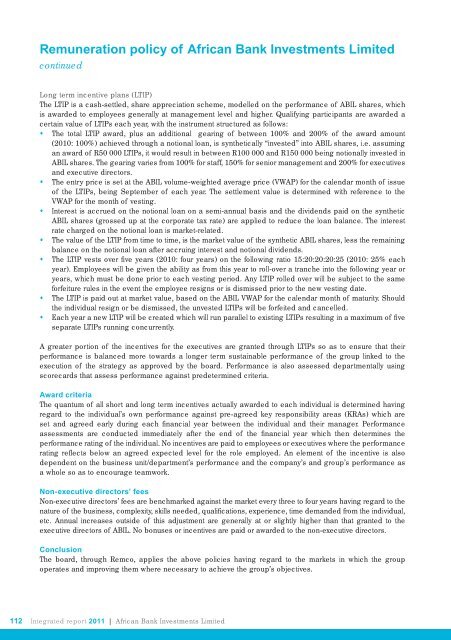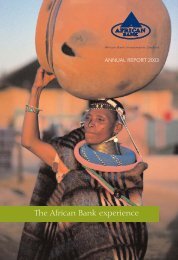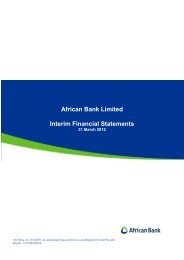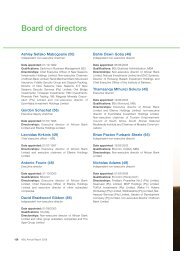Full integrated annual report - African Bank - Investoreports
Full integrated annual report - African Bank - Investoreports
Full integrated annual report - African Bank - Investoreports
Create successful ePaper yourself
Turn your PDF publications into a flip-book with our unique Google optimized e-Paper software.
Remuneration policy of <strong>African</strong> <strong>Bank</strong> Investments Limited<br />
continued<br />
Long term incentive plans (LTIP)<br />
The LTIP is a cash-settled, share appreciation scheme, modelled on the performance of ABIL shares, which<br />
is awarded to employees generally at management level and higher. Qualifying participants are awarded a<br />
certain value of LTIPs each year, with the instrument structured as follows:<br />
The total LTIP award, plus an additional gearing of between 100% and 200% of the award amount<br />
(2010: 100%) achieved through a notional loan, is synthetically “invested” into ABIL shares, i.e. assuming<br />
an award of R50 000 LTIPs, it would result in between R100 000 and R150 000 being notionally invested in<br />
ABIL shares. The gearing varies from 100% for staff, 150% for senior management and 200% for executives<br />
and executive directors.<br />
The entry price is set at the ABIL volume-weighted average price (VWAP) for the calendar month of issue<br />
of the LTIPs, being September of each year. The settlement value is determined with reference to the<br />
VWAP for the month of vesting.<br />
Interest is accrued on the notional loan on a semi-<strong>annual</strong> basis and the dividends paid on the synthetic<br />
ABIL shares (grossed up at the corporate tax rate) are applied to reduce the loan balance. The interest<br />
rate charged on the notional loan is market-related.<br />
The value of the LTIP from time to time, is the market value of the synthetic ABIL shares, less the remaining<br />
balance on the notional loan after accruing interest and notional dividends.<br />
The LTIP vests over fi ve years (2010: four years) on the following ratio 15:20:20:20:25 (2010: 25% each<br />
year). Employees will be given the ability as from this year to roll-over a tranche into the following year or<br />
years, which must be done prior to each vesting period. Any LTIP rolled over will be subject to the same<br />
forfeiture rules in the event the employee resigns or is dismissed prior to the new vesting date.<br />
The LTIP is paid out at market value, based on the ABIL VWAP for the calendar month of maturity. Should<br />
the individual resign or be dismissed, the unvested LTIPs will be forfeited and cancelled.<br />
Each year a new LTIP will be created which will run parallel to existing LTIPs resulting in a maximum of fi ve<br />
separate LTIPs running concurrently.<br />
A greater portion of the incentives for the executives are granted through LTIPs so as to ensure that their<br />
performance is balanced more towards a longer term sustainable performance of the group linked to the<br />
execution of the strategy as approved by the board. Performance is also assessed departmentally using<br />
scorecards that assess performance against predetermined criteria.<br />
Award criteria<br />
The quantum of all short and long term incentives actually awarded to each individual is determined having<br />
regard to the individual’s own performance against pre-agreed key responsibility areas (KRAs) which are<br />
set and agreed early during each fi nancial year between the individual and their manager. Performance<br />
assessments are conducted immediately after the end of the fi nancial year which then determines the<br />
performance rating of the individual. No incentives are paid to employees or executives where the performance<br />
rating refl ects below an agreed expected level for the role employed. An element of the incentive is also<br />
dependent on the business unit/department’s performance and the company’s and group’s performance as<br />
a whole so as to encourage teamwork.<br />
Non-executive directors’ fees<br />
Non-executive directors’ fees are benchmarked against the market every three to four years having regard to the<br />
nature of the business, complexity, skills needed, qualifi cations, experience, time demanded from the individual,<br />
etc. Annual increases outside of this adjustment are generally at or slightly higher than that granted to the<br />
executive directors of ABIL. No bonuses or incentives are paid or awarded to the non-executive directors.<br />
Conclusion<br />
The board, through Remco, applies the above policies having regard to the markets in which the group<br />
operates and improving them where necessary to achieve the group’s objectives.<br />
112 Integrated <strong>report</strong> 2011 | <strong>African</strong> <strong>Bank</strong> Investments Limited







